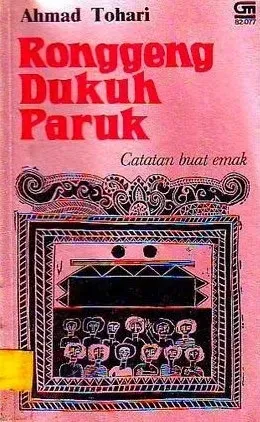Ronggeng Dukuh Paruk

Author: Ahmad Tohari
Category: Fiction, literature
Language: Indonesian
Publication Year: 1982
Pages: 174
Description:
*Ronggeng Dukuh Paruk* by Ahmad Tohari is a novel that takes readers into the heart of rural Indonesia, blending folklore, culture, and social commentary in a narrative that’s as captivating as it is reflective. The story revolves around Srintil, a young girl chosen to become the *ronggeng* (traditional Javanese dancer) of Dukuh Paruk, a small, poor village deeply rooted in old traditions. This role, while prestigious, comes with its share of complications, as Srintil’s journey unfolds against the backdrop of her village’s struggles with poverty, ignorance, and a changing world.
The novel opens by introducing Dukuh Paruk, a remote village that’s almost forgotten by the rest of society, living in its own bubble of customs and beliefs. For the people of this village, the *ronggeng* is more than just a dancer—she’s a symbol of spiritual connection to their ancestors and a source of pride for the community. When Srintil shows early signs of possessing the mystical talent required to become a *ronggeng*, the villagers see her as a reincarnation of past dancers, destined to continue the tradition.
But for Srintil, this prestigious role is not as glamorous as it seems. The life of a *ronggeng* is fraught with expectations, not just to entertain through dance but also to engage in sexual relationships with men in the village—a societal expectation that is both celebrated and, paradoxically, shrouded in judgment. This aspect of Srintil’s role gives the novel a complex layer, as it critiques the way women’s bodies and choices are controlled and commodified by tradition.
Srintil, though young, is deeply aware of the power and responsibility that come with her position. She seeks validation and significance in her role, but also wrestles with the personal sacrifices it demands. Her rise to fame as the *ronggeng* is juxtaposed against the loss of her innocence and the conflict between her individual desires and what her village expects of her. This internal struggle is one of the novel’s core themes, and Tohari masterfully explores it without passing judgment, letting the reader grapple with the ethical complexities of Srintil’s situation.
Rasus, a childhood friend of Srintil and one of the novel’s key characters, serves as a counterpoint to her. His love for Srintil is pure, but his growing disillusionment with the traditional values of Dukuh Paruk, especially regarding the *ronggeng* tradition, creates a rift between them. Rasus eventually leaves the village to join the military, symbolizing the pull of modernity and change, while Srintil stays behind, tied to the village and its unyielding customs. Their relationship is deeply tragic, as both characters are pulled in different directions by forces beyond their control.
At its heart, *Ronggeng Dukuh Paruk* is not just about Srintil’s personal journey, but also about the broader societal issues that Tohari weaves into the narrative. The novel examines the intersection of tradition and modernity, poverty and ignorance, and the place of women in a male-dominated society. Through Srintil’s experiences, Tohari critiques the way rural communities often cling to outdated practices, even when those practices harm the very people they’re meant to celebrate.
What makes Tohari’s writing so powerful is his ability to evoke the atmosphere of Dukuh Paruk. He paints the village in vivid, sometimes stark, detail, from its drought-stricken fields to its spiritual ceremonies. The village itself becomes a character in the novel—at once beautiful and suffocating, a place where tradition is both revered and questioned. Tohari’s prose is simple but poetic, and he uses it to capture both the harshness and beauty of rural life in Indonesia. His deep connection to Javanese culture is evident, but he doesn’t shy away from exposing its flaws.
The political climate of Indonesia also seeps into the story, particularly as Rasus becomes involved in the military during a time of national turmoil. Tohari sets the novel during the early 1960s, a period marked by political unrest and the rise of communism in Indonesia. This tension adds another layer to the novel, as Dukuh Paruk, isolated and ignorant of national politics, is slowly pulled into the wider currents of Indonesian history. The novel shows how the lives of ordinary people, far removed from the centers of power, are still profoundly affected by political events.
*Ronggeng Dukuh Paruk* is a poignant, thought-provoking novel that highlights the conflict between personal freedom and societal expectations, as well as the tension between preserving tradition and embracing change. Srintil’s story is one of resilience, tragedy, and the search for meaning in a world that often feels indifferent to individual suffering. Ahmad Tohari’s rich storytelling brings to life a village caught in time, and through it, he explores timeless issues of gender, power, and cultural identity.
This novel isn’t just a window into Indonesian village life—it’s also a universal tale of the human struggle to find autonomy in a world governed by tradition and circumstance. It’s beautifully written, emotionally resonant, and offers a nuanced look at the complexities of rural society. If you’re a fan of literary fiction that blends culture with deeply personal stories, *Ronggeng Dukuh Paruk* is well worth the read.
Personal Notes:
I read "Ronggeng Dukuh Paruk" when I was a teenager. This story was published as a serial in the KOMPAS Daily in the 1980s.
Back to Home